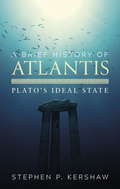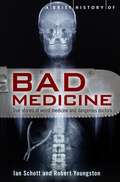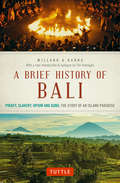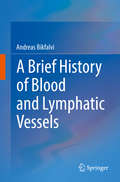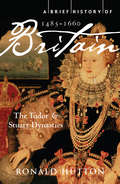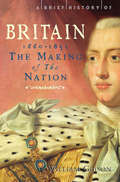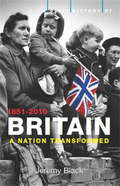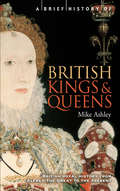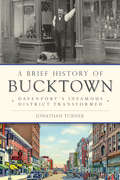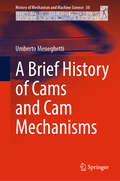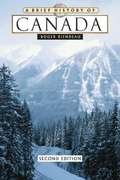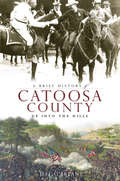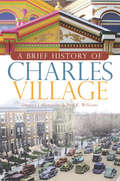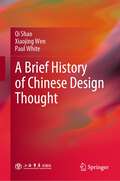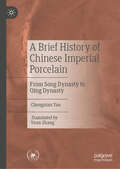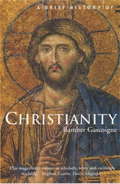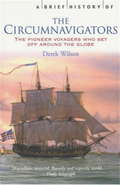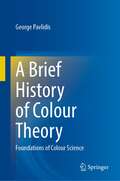- Table View
- List View
A Brief History of Atlantis: Plato's Ideal State
by Stephen P. KershawThe Atlantis story remains one of the most haunting and enigmatic tales from antiquity, and one that still resonates very deeply with the modern imagination. But where did Atlantis come from, what was it like, and where did it go to?Atlantis was first introduced by the Greek philosopher Plato in two dialogues the Timaios and Kritias, written in the fourth century BC. As he philosophises about the origins of life, the Universe and humanity, the great thinker puts forward a stunning description of Atlantis, an island paradise with an ideal society. But the Atlanteans degenerate and become imperialist aggressors: they fight against antediluvian Athens, which heroically repels their mighty forces, before a cataclysmic natural disaster destroys the warring states. His tale of a great empire that sank beneath the waves has sparked thousands of years of debate over whether Atlantis really existed. But did Plato mean his tale as history, or just as a parable to help illustrate his philosophy?The book is broken down into two main sections plus a coda - firstly the translations/commentaries which will have the discussions of the specifics of the actual texts; secondly a look at the reception of the myth from then to now; thirdly a brief round-off bringing it all together.
A Brief History of Atlantis: Plato's Ideal State (Brief Histories)
by Dr Stephen P. KershawThe Atlantis story remains one of the most haunting and enigmatic tales from antiquity, and one that still resonates very deeply with the modern imagination. But where did Atlantis come from, what was it like, and where did it go to?Atlantis was first introduced by the Greek philosopher Plato in two dialogues the Timaios and Kritias, written in the fourth century BC. As he philosophises about the origins of life, the Universe and humanity, the great thinker puts forward a stunning description of Atlantis, an island paradise with an ideal society. But the Atlanteans degenerate and become imperialist aggressors: they fight against antediluvian Athens, which heroically repels their mighty forces, before a cataclysmic natural disaster destroys the warring states. His tale of a great empire that sank beneath the waves has sparked thousands of years of debate over whether Atlantis really existed. But did Plato mean his tale as history, or just as a parable to help illustrate his philosophy?The book is broken down into two main sections plus a coda - firstly the translations/commentaries which will have the discussions of the specifics of the actual texts; secondly a look at the reception of the myth from then to now; thirdly a brief round-off bringing it all together.
A Brief History of Bad Medicine (Brief Histories )
by Ian Schott Robert YoungstonA doctor removes the normal, healthy side of a patient's brain instead of the malignant tumor. A man whose leg is scheduled for amputation wakes up to find his healthy leg removed. These recent examples are part of a history of medical disasters and embarrassments as old as the profession itself.In Brief History of Bad Medicine, Robert M. Youngson and Ian Schott have written the definitive account of medical mishap in modern and not-so- modern times. From famous quacks to curious forms of sexual healing, from blunders with the brain to drugs worse than the diseases they are intended to treat, the book reveals shamefully dangerous doctors, human guinea pigs, and the legendary surgeon who was himself a craven morphine addict.Exploring the line between the comical and the tragic, the honest mistake and the intentional crime, Brief History of Bad Medicine illustrates once and for all that you can't always trust the people in white coats.
A Brief History of Bad Medicine (Brief Histories)
by Ian Schott Robert YoungstonA doctor removes the normal, healthy side of a patient's brain instead of the malignant tumor. A man whose leg is scheduled for amputation wakes up to find his healthy leg removed. These recent examples are part of a history of medical disasters and embarrassments as old as the profession itself.In Brief History of Bad Medicine, Robert M. Youngson and Ian Schott have written the definitive account of medical mishap in modern and not-so- modern times. From famous quacks to curious forms of sexual healing, from blunders with the brain to drugs worse than the diseases they are intended to treat, the book reveals shamefully dangerous doctors, human guinea pigs, and the legendary surgeon who was himself a craven morphine addict.Exploring the line between the comical and the tragic, the honest mistake and the intentional crime, Brief History of Bad Medicine illustrates once and for all that you can't always trust the people in white coats.
A Brief History of Bali: The Story of a Pacific Paradise
by Willard A. Hanna Tim HanniganThis book tells the story of Bali-the "paradise island of the Pacific"-its rulers and its people, and their encounters with the Western world.Bali is a perennially popular tourist destination. It is also home to a fascinating people with a long and dramatic history of interactions with foreigners, particularly after the arrival of the first Dutch fleet in 1597. In this first comprehensive history of Bali, author Willard Hanna chronicles Bali through the centuries as well as the islanders' current struggle to preserve their unique identity amidst the financially necessary incursions of tourism.Illustrated with more than forty stunning photographs, A Brief History of Bali is a riveting tale of one ancient culture's vulnerability-and resilience-in the modern world.
A Brief History of Blood and Lymphatic Vessels
by Andreas BikfalviThis book provides a comprehensive account of vascular biology and pathology and its significance for health and disease. It systematically and chronologically explains how we came to our current understanding of the vasculature and it´s function today, and describes in an entertaining way the diverse flaws and turns in science and medicine from the past. It thereby offers a complete and well-studied history on vascular biology and medicine. The book has an easy-to-read style and is written for students as well as scientists, physicians and lecturers in the field of biomedicine, human physiology, cardiology and hematology.
A Brief History of Britain 1485-1660: The Tudor and Stuart Dynasties
by Ronald HuttonFrom the death of Richard III on Bosworth Field in 1485 to the execution of Charles I, after the Civil Wars of 1642-48, England was transformed by two Dynasties. Firstly the Tudors, who won the crown on the battlefield and changed both the nature of kingship but also the nation itself. England became a Protestant nation and began to establishment itself as a trading power; facing down impossible odds it defeated its enemies on land and sea. Yet after a century Elizabeth I died with no heir and the crown was passed to the Stuarts, who were keen to remould the kingdom in their own image. Leading Historian, Ronald Hutton brilliantly recreates the political landscape over this early modern period and shows how the modern nation was forged in these anxious, transformative years. Combining skilful pen portraits of the leading figures, culture, economics and accounts of everyday life, he reveals insights in this key era in our nation's story.This the second book in the four volume Brief History of Britain which brings together some of the leading historians to tell our nation's story from the Norman Conquest of 1066 to the present-day. Combining the latest research with accessible and entertaining story telling, it is the ideal introduction for students and general readers.
A Brief History of Britain 1485-1660: The Tudor and Stuart Dynasties (Brief Histories)
by Professor Ronald HuttonPraise for the author::'For anyone researching the subject, this is the book you've been waiting for.'Washington PostFrom the death of Richard III on Bosworth Field in 1485 to the execution of Charles I after the Civil Wars of 1642-48, England was transformed by two dynasties.First, the Tudors, who had won the crown on the battlefield, changed both the nature of kingship and the nation itself. England became Protestant and began to establish itself as a trading power; facing down seemingly impossible odds, it defeated its enemies on land and sea. But after a century, Elizabeth I died with no heir and the crown was passed to the Stuarts, who sought to remould the kingdom in their own image.Leading authority on the history of the British Isles in the sixteenth and seventeenth centuries, Ronald Hutton brilliantly recreates the political landscape of this early modern period and shows how the modern nation was forged in these febrile, transformative years. Combining skilful pen portraits of the leading figures of the day with descriptions of its culture, economics and vivid accounts of everyday life, Hutton provides telling insights into this critical period on Britain's national history.This the second book in the landmark four-volume Brief History of Britain which brings together leading historians to tell Britain's story, from the Norman Conquest of 1066 to the present day. Combining the latest research with accessible and entertaining story-telling, the series is the ideal introduction for students and general readers.
A Brief History of Britain 1660 - 1851: The Making of the Nation (Brief Histories)
by William GibsonPraise for the author:'Gibson's well written and well-documented account of James and the bishops will surely become the new standard authority on these "implausible revolutionaries" for many decades.' Barbara Brandon Schnorrenberg, Anglican and Episcopal HistoryIn 1660, England emerged from the devastation of the Civil Wars and restored the king, Charles II, to the throne. Over the next 190 years Britain would establish itself as the leading nation in the world - the centre of a burgeoning empire, at the forefront of the Enlightenment and the driving force behind the Industrial Revolution.However, radical change also brought with it anxiety and violence. America was lost in the War of Independence and calls for revolution at home were never far from the surface of everyday life. In this vivid and convincing overview of the era in which Britain transformed the world and was itself remade, leading historian of the period William Gibson also looks at the impact of this revolutionary change on the ordinary citizens of Britain.This is the third book in this wonderfully concise four-volume Brief History of Britain which brings together leading historians to tell the story of Britain from the Norman Conquest of 1066 right up to the present day. Combining the latest research with accessible and entertaining story-telling, it is the ideal introduction to British history for students and general readers.
A Brief History of Britain 1660 - 1851: Volume 3
by William GibsonHow Great Britain was born - from the restoration to the Great Exhibition.In 1660 England emerged from the devastations of the Civil Wars and restored the king, Charles II, to the throne. Over the next 190 years Britain would establish itself as the leading nation in the world - the centre of burgeoning Empire, at the forefront of the Enlightenment and the Industrial Revolution. However, radical change also brought with it anxiety and violence. America is lost in the War of Independence and calls for revolution at home are never far from the surface of everyday life. In this scintillating overview of the era in which Britain changed the world, and how that nation was transformed as a result. William Gibson also looks at the impact of this transformation had upon the ordinary men and women.This the is the third book in the four volume Brief History of Britain which brings together some of the leading historians to tell our nation's story from the Norman Conquest of 1066 to the present-day. Combining the latest research with accessible and entertaining story telling, it is the ideal introduction for students and general readers.
A Brief History of Britain 1851-2010: Volume 4
by Jeremy BlackFrom the Great Exhibition to the Credit Crunch - the transformation of Britain from the world's greatest nation to the present dayIn 1851 Queen Victoria opened the Great Exhibition in Hyde Park, it was the high water mark of English achievement - the nation at the forefront of the Industrial Revolution, at the heart of a burgeoning Empire, with a queen who would reign for another 50 years. In the following 150 years, the fate of the nation has faced turmoil and transformation. But it is too simple to talk of decline? Has Great Britain sacrificed its identity in order to stay part of the present world order. Leading historian, Jeremy Black, completes the landmark four volume Brief History of Britain series with a brilliant, insightful examination of how present day Britain was formed.
A Brief History of Britain 1851-2021: From World Power to ? (Brief Histories)
by Jeremy BlackFrom the Great Exhibition's showcasing of British national achievement in 1851 to the opening ceremonies of the Olympics in Stratford in 2012 and on to Brexit, an insightful exploration of the transformation of modern BritainThis revised and updated fourth and final volume in the concise Brief History of Britain series begins in the specially-constructed Crystal Palace, three times the length of St Paul's Cathedral, in Hyde Park at the beginning of the second half of the nineteenth century. The Great Exhibition it housed marked a high point of British national achievement, at the forefront of the Industrial Revolution, at the heart of a great empire, with Queen Victoria still to reign for fifty years. It was a time of confidence in the future, and exuberant patriotism for Britain's role in it.The beginning of the Second World War in 1939 marks a turning point because of the great change it heralded in Britain's global standing. At its peak, protected by the world's greatest navy, the British Empire stretched from Australasia to Canada, from Hong Kong and India to South Africa, and from Jamaica to the Falklands. Now the empire is no more: a fundamental change not only for the world, but also for Britain. The Second World War had been won, but it had exhausted Britain and marked the beginning of its national decline.Black links cultural and political developments closely - transport, health, migration and economic and demographic factors - in order to make clear how porous and changeable the manifestations of national civilisation can be, and to make sense of themes such as the triumph of town over country, Britain's international clout and the shift from the dominance of the market at the turn of the nineteenth century to the growing significance of the state. Importantly, he also looks at how public history has presented the nation's past, and how the changing and different ways we look at that past are central aspects of our shared history.
A Brief History of British Kings & Queens (Brief History)
by Mike AshleyHere is the whole of recorded British royal history, from the legendary King Alfred the Great onwards, including the monarchies of England, Scotland, Wales and the United Kingdom for over a thousand years. <P><P>Fascinating portraits are expertly woven into a history of division and eventual union of the British Isles - even royals we think most familiar are revealed in a new and sometimes surprising light. This revised and shortened edition of The Mammoth Book of British Kings & Queens includes biographies of the royals of recorded British history, plus an overview of the semi-legendary figures of pre-history and the Dark Ages - an accessible source for students and general readers.
A Brief History of Bucktown: Davenport's Infamous District Transformed (Brief History)
by Jonathan TurnerGerman immigrants created leafy beer gardens here nearly two centuries ago, establishing Bucktown as the heart of entertainment in downtown Davenport for generations. In 1916, the founding of the Tri-City Symphony Orchestra at the Burtis Opera House embodied the neighborhood's reputation for high culture. The numerous saloons and theaters, as well as the forty-two documented brothels that flourished within two blocks, lent a bawdy side to the good times. Varied industries thrived through World War II, and downtown bustled with shoppers visiting department stores like Petersen's. Later, the neighborhood struggled and declined as a farming crisis hit the region hard. With revitalized landmarks like the magnificent Hotel Blackhawk and the historic Redstone Building, the community is growing more vibrant as a place to live, work and play. Author Jonathan Turner explores this dynamic history and transformation.
A Brief History of Cams and Cam Mechanisms (History of Mechanism and Machine Science #50)
by Umberto MeneghettiThis book offers a description of the evolution of cams and their uses from the Middle Ages to the present day, highlighting their contribution to the development of technology. Usually, in the history of technology the diverse types of machines are taken into account, but the importance of cams is not emphasized, which are often fundamental for the operation of such machines. In this book the focus is instead on cams, understood as important, and often essential, components of machines that have had significant importance in the development of technology. It treats technical aspects at a level easily accessible even to non-experts in mechanics and the various applications are illustrated with many figures. The book serves as a reference work for those interested in both the history of technology and machines in general, and it helps them deal with certain mechanical problems, even starting from solutions already obtained with cams and, perhaps, overcoming them with others suggested by current developments in technology.
A Brief History of Canada (2nd edition)
by Roger E. RiendeauThis is a new edition of a general history of Canada by Riendeau (U. of Toronto, Canada) that extends the treatment through 2007. It begins in the pre-European settlement era and gives an account of French colonial development, the transition to British rule, the development of the national constitution, and the emergence of the modern order. The focus of the volume is on political and economic developments. Annotation ©2007 Book News, Inc., Portland, OR (booknews.com)
A Brief History of Catoosa County: Up Into the Hills (Brief History)
by Jeff O'BryantCatoosa County's rich history touches upon many of thedefining events and social changes of America's past. As settlers expanded westward, Georgia forcibly removed Native Americans from the boundaries of what would eventually form Catoosa, a Cherokee name that the settlers adopted as their own. As the site of the second most costly battle in the Civil War, Chickamauga set the stage for much that followedin Catoosa's history, from the end of a three-thousand-year-old mode of warfare to the beginnings of women's service in the military. Though nearly one million people visit Chickamauga and Chattanooga National Military Park each year seeking to understand and connect to the Civil War struggle, many remain unaware of the larger part Catoosa played in the unfolding drama of America. Join local historian Jeff O'Bryant as he brings this valuable heritage to light.
A Brief History of Charles Village
by Paul K. Williams Gregory J. AlexanderBaltimore Orioles, infamous bootleggers, novelists of the Jazz Age and famous musicians have all wandered and lived among the stately Victorian homes and vibrant "painted ladies" of Charles Village. From its beginning as a series of country villas for the wealthy elite of Baltimore to escape the crush of downtown, the neighborhood has become a diverse and vibrant cultural hub of the city. Local authors Gregory J. Alexander and Paul K. Williams chart the evolution of this famous Baltimore community and its institutions while telling fascinating tales of some of its most colorful residents.
A Brief History of Chinese Design Thought
by Paul White Qi Shao Xiaojing WenThis book introduces readers to the history of design thinking in pre-modern China. The content is structured according to successive dynasties, covering the seven major periods of the pre-Qin, Qin and Han, Wei and Jin, Sui and Tang, Song and Yuan, Ming, and Qing dynasties. Each chapter introduces the most representative individuals of the period and discusses their work and ideas in order to reveal the national and cultural features of the respective periods. A distinctive feature of cultural identity running through the long course of China’s historical development is the argument that actions are determined by ideas: Such a view can be found in long-standing thinking on art, design, and creativity. The book demonstrates that conscious design is the vital link between the ideas that constitute human cultures and the physical objects that make up their resulting material cultures. It is the attribute of design that defines what it is to be human and also produces the physical evidence of the evolution of Chinese civilization. The book reveals the integrated characteristics of Chinese culture and art and shows how both changing and recurring ideologies have influenced Chinese design practice since the ancient Shang and Zhou dynasties and how these forces have shaped the spirit and materiality of Chinese civilization. Design is the cornerstone that has made China one of the major contributors to human civilization throughout the thousands of years of its history.Given its focus, the book largely appeals to two main audiences: an academic readership of students and researchers interested in cultural studies and, a more general one, consisting of those interested in international comparisons and wishing to learn more about Chinese history, society, and culture. In order to appeal to both, the book is written in a clear and accessible language.
A Brief History of Chinese Imperial Porcelain: From Song Dynasty to Qing Dynasty
by Chongnian YanThis book provides a unique history of the Porcelain Road against the backdrop of Chinese and Western cultural exchanges. Written by one of China’s most influential scholars, it introduces the history of Chinese Porcelain, especially the history of the imperial porcelain kiln, taking the most representative porcelain of each period as examples, and examining relevant historical background. Studying artifacts from well-known collections such as the Palace Museum, Taipei Palace Museum, Shenyang Palace Museum, Nanjing Museum, this text offers a unique discussion of China’s porcelain culture and history, and will be of relevance to all those interested in one of the key aspects of Chinese culture and cultural exchanges between East and West.
A Brief History of Christianity: New Updated Edition (Brief Histories)
by Bamber GascoigneThe story of Christianity is one of colossal undertakings and spectacular successes as well as ferocious intolerance, greed and bloodshed. Bamber Gascoigne traces a clear path through a complicated history, exploring the motives, the passions, the fears and the achievements of the Christians. His approach is objective and he writes in a conversational style, focusing on moments of significant detail and a vast and varied cast of characters.
A Brief History of Christianity: New updated edition
by Bamber GascoigneThis volume tells the story of Christianity through the individual men and women who shaped it. It is a story of colossal undertakings and spectacular successes as well as ferocious intolerance, greed and bloodshed. Bamber Gascoigne traces a clear path through a complicated history, exploring the motives, the passions, the fears and the achievements of the Christians. His approach is objective and he writes in a conversational style, focusing on moments of significant detail and a vast and varied cast of characters.
A Brief History of Circumnavigators
by Derek Wilson"Going round the world" is an idea that has excited people ever since it was realized that the earth was a sphere. The appeal has something to do with encompassing all the known environment and exploring the unknown, not only on the surface of the planet but within the spirit of the explorer. The story of circumnavigation is thus a long saga of human adventure, travel and discovery. Beginning with the fateful day in 1521 when Ferdinand Magellan was speared to death on Mactan and Juan de Elcano took up the challenge of bringing his surviving companions home, the story continues through four centuries crammed with astonishing exploits by men and women of many nations. Some of the names that feature are well-known, others less so.
A Brief History of Circumnavigators (Brief Histories)
by Mr Derek Wilson"Going round the world" is an idea that has excited people ever since it was realized that the earth was a sphere. The appeal has something to do with encompassing all the known environment and exploring the unknown, not only on the surface of the planet but within the spirit of the explorer. The story of circumnavigation is thus a long saga of human adventure, travel and discovery. Beginning with the fateful day in 1521 when Ferdinand Magellan was speared to death on Mactan and Juan de Elcano took up the challenge of bringing his surviving companions home, the story continues through four centuries crammed with astonishing exploits by men and women of many nations. Some of the names that feature are well-known, others less so.
A Brief History of Colour Theory: Foundations of Colour Science
by George PavlidisThis book offers a comprehensive introduction in to the various theories of colour and how they developed over the centuries and millennia. As colour is the perception of light by our brains, the book captures not only the physical phenomena but also psychological and philosophical aspects of colours. It starts with ancient studies of Greek philosophers and their insights into light and mirrors, then reviews the theory of colors in the middle ages in Europe and Middle East. The last big part of the book explains the theories of colours by modern scientists and philosophers, starting with Isaac Newton and ending colour schemes of modern digital pictures.
